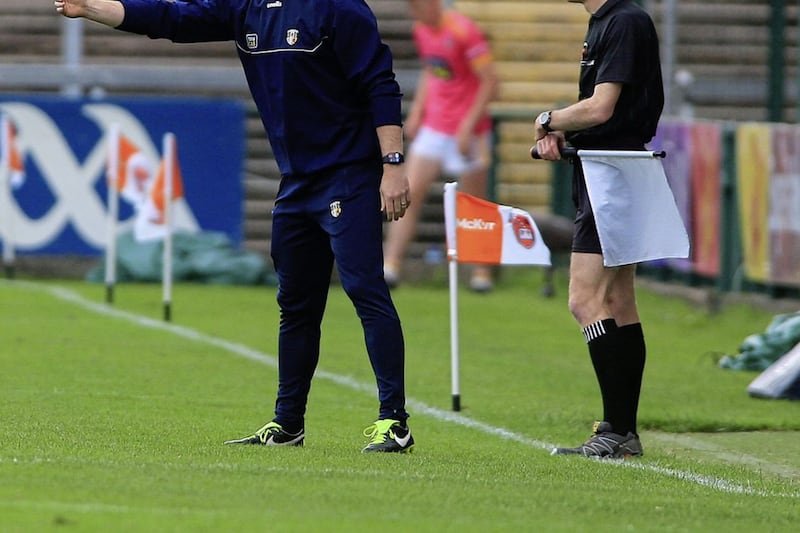THE End Is Nigh! I remember seeing these proclamations on the rare occasions of days out to the big smoke as a child.
It pricked my interest enough to enquire to my mother, as we walked past him in his sandwich board, what it was all about.
I can’t remember her exact response but it was something to the point that, while religion and faith are good things, this particular fanaticism was not to be given any attention.
While time has afforded a degree of more understanding, it still stands that when you continually shout about dramatic consequences people tend to ignore you.
This week’s announcement by the CPA had a similar end of day’s prophecy regarding the GAA.
Long before the CPA arrived on the scene, almost every juncture or crisis has been seen as the possible death knell for the Association as we know it.
The CPA didn’t invent that narrative but they certainly have been on that train of thought from their inception.
This week’s statement, however, was several steps up in terms of a palpable sense of frustration and anger. They outlined four key and inter-linked factors they see to be at the heart of the problems within the GAA, namely fixtures, finance, lack of central governance and the loss of the GAA's club-based identity.
There is much in their statement with validity but the tone makes it feel a bit like the man with the sandwich board has started to rush around yelling his message at people.
The most likely response is to press the mute button and scurry quickly by.
Given the Covid crisis that remains on our doorsteps and currently thrashing any attempt globally to control it, the CPA's use of terms such as ‘crisis’, ‘dangerous atmosphere’, ‘poisonous’ and ‘utmost urgency’ about a sporting issue seems jarringly out of place.
In fact, they went full-on Covid hyperbole when they asserted the need to “stop this problem in its tracks, eliminate the problems at source and flatten the fixtures curve”.
It is this type of language that feeds into many within the Association dismissing them as 'rebel-rousing eejits'.
Yet, as I mentioned earlier, there is much in their statement that will strike a chord and with which I genuinely agree.
They have suggested a new games program, organised, run and enforced from national level.
Rather than our traditionally merged seasons where players end up being shared between various teams, the seasons would be independent of each other through dividing the calendar up into distinct periods for club, county or tertiary competitions like third level or schools.
Competitions would be redesigned to fit within these windows.
Of course this is in effect what we are currently experiencing.
Thanks to Covid-induced changes the club season is currently in full flow and the county season won’t kick off until its completion.
The current scenario is unprecedented within the GAA yet for me it has opened a lot of eyes to the potential benefits of it.
Clubs are experiencing what it is like to have an extended period of full access to players without county looming in the background.
The impact for anyone close to the club game is obvious. Numbers at training are up, quality is up and I dare say enjoyment is up.
The difference at having a full panel of players together every night with no competing interests brings a proper sense of team and club unity. Give me a four or six-month period of this any time over a nine or ten-month bit-part season where fixtures are all over the place and boys are dipping in and out of training.
Some might argue four to six months is too short a season, but if it’s good enough for Australian Rules or American Football it might just do us and again I’d take the quality over quantity at every opportunity.
The CPA go on to propose a national referendum where each club would hold a general meeting to decide on these landmark calendar and competition changes.
I think this is an excellent idea and would return a true sense of democracy to the members.
There is a disconnect between ordinary members and the voting procedures at Congress which has resulted in an ongoing difficulty accepting many of these decisions by the grassroots.
That feeling of alienation has served to foster the feeling of a them-and-us or club-v-county that feels endemic within the Association at present.
It may be difficult to understand for those in power and attending such events who continue to see them as beacons of democracy, but on the ground, they must realise it feels like anything but.
The CPA are also right in pointing out that despite being portrayed as too big to take on or, at the very least, requiring a slow, staged process, that significant re-structuring of competitions can and has been carried out in a very condensed time frame.
As pointed out by the CPA, the Association was able to take swift and decisive action on fixtures in response to Covid and therefore there is no reason that similar wholesale and rapid changes cannot be carried out in the face of the crisis as they see it, within our games.
The melodramatic tone of the announcement can be put down to understandable frustration, not just at their previous inputs going unheard but by being completely ignored and seemingly considered an irrelevance.
Strip that away and there is much that merits genuine consideration within it. The end mightn’t be nigh, but the real crisis of Covid has presented us with a new potential way of doing things and a clear moment in time with which genuine change may be embraced.
Make no mistake, the end is not nigh for the GAA; far from it, but it would be a pity to miss an opportunity to truly consider some real change and to listen to those famous grassroots.









